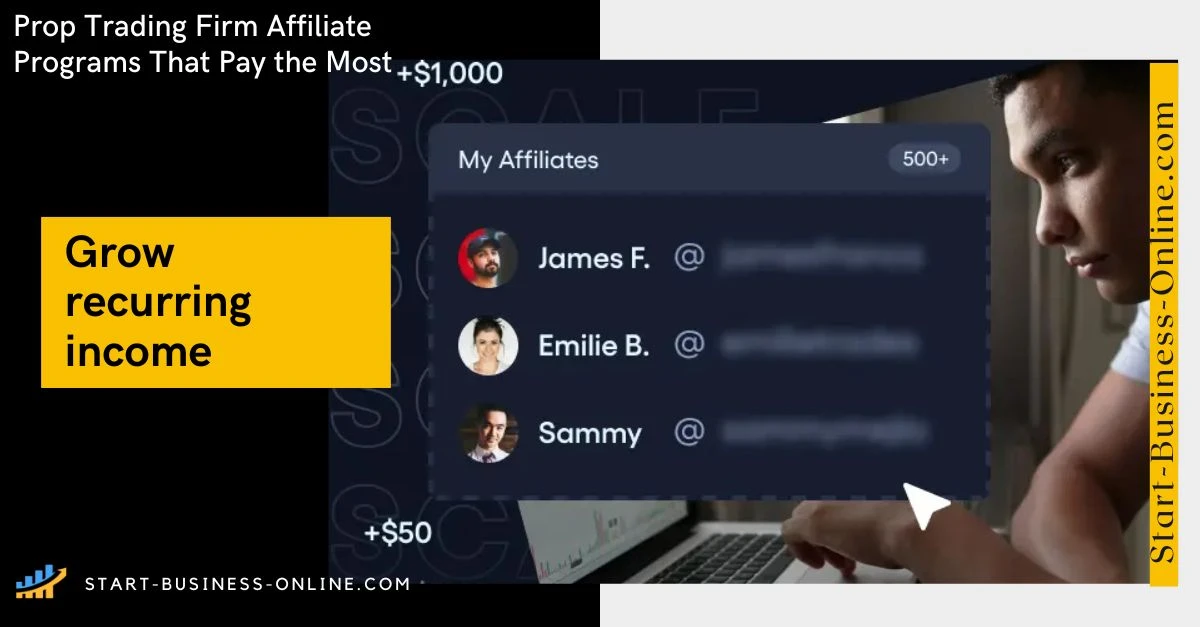Affiliate marketing has become one of the fastest-growing revenue channels in finance. Within prop trading, Prop Firm Trading Affiliate programs give marketers, educators, and influencers a powerful way to earn commissions by referring traders who buy funded account challenges. This guide explains how these programs work, why firms run them, and what affiliates need to know to succeed in 2025.
Page Contents
- 1. What Are Prop Firm Affiliate Programs?
- 2. How Prop Firm Affiliate Programs Work
- 3. Why Prop Firms Offer Affiliate Programs
- 4. Types of Prop Firm Affiliate Payout Models
- 5. How Affiliates Make Money in Practice
- 6. Advantages for Affiliates
- 7. Advantages for Prop Firms
- 8. Best Practices to Succeed as a Prop Trading Affiliate
- 9. Industry Trends & Key Statistics
- 10. Top Prop Firm Affiliate Programs Comparison
- 11. SEO & AI Search Optimization Tips
- 12. Common Misconceptions
- 13. Affiliate Programs Frequently Asked Questions (FAQs)
View more
What Are Prop Firm Affiliate Programs?
A Prop Firm Affiliate program is a structured partnership between a proprietary trading firm and marketers. Affiliates earn commissions whenever a trader signs up or purchases a challenge through their referral. Instead of relying solely on paid ads, firms use affiliates with existing communities and content channels to reach motivated traders.
Example: A $500 challenge sale could generate a $200 commission for the affiliate. Tracking is managed through unique links or discount codes.
How Prop Firm Affiliate Programs Work
The process is simple and standardized across most firms:
- Register: Sign up for the affiliate program (usually free).
- Get tools: Receive tracking links, promo codes, and an affiliate dashboard.
- Promote: Share links via blogs, YouTube, TikTok, Discord, Telegram, or newsletters.
- Earn: Collect commissions when traders purchase through your referrals.
Most firms use cookie-based systems and automated dashboards to ensure accurate tracking and credit.
Why Prop Firms Offer Affiliate Programs
- Lower acquisition costs: Cheaper than paid advertising.
- Community trust: Affiliates often run engaged trading groups.
- High conversion rates: Traders are motivated buyers.
- Win–win system: Traders access funding, firms acquire clients, affiliates earn payouts.
Types of Prop Firm Affiliate Payout Models
- CPA (Cost Per Acquisition): One-time flat fee per signup.
- Revenue Share: Ongoing cut of a trader’s purchases (often 10–20%).
- Hybrid: Mix of CPA + revenue share.
- Tiered Payouts: Higher commission rates after certain referral volumes.
How Affiliates Make Money in Practice
Let’s illustrate with numbers:
- Challenge cost: $499
- Commission rate: 15%
- Payout per signup: $74.85
At 10 signups per week, affiliates could earn nearly $3,000/month. Top affiliates report $10,000–$60,000/month by scaling content across multiple platforms.
Advantages for Affiliates
- No capital risk compared to trading.
- No trading skills required; marketing skills matter most.
- Scalable with SEO, YouTube, TikTok, and communities.
- Access to exclusive coupons and bonus incentives.
Advantages for Prop Firms
- Lower client acquisition costs than PPC ads.
- Leverages affiliates with niche audiences.
- Builds long-term brand credibility through trusted educators and influencers.
Best Practices to Succeed as a Prop Trading Affiliate
- Be selective: Partner only with transparent, reliable firms.
- Create valuable content: Reviews, comparisons, and guides convert best.
- Leverage SEO & video: Blogs and YouTube provide steady traffic.
- Use exclusive coupons: Discounts tied to affiliate codes boost signups.
- Diversify: Promote multiple firms to reduce reliance on one.
Industry Trends & Key Statistics
- $37.3B in 2025: Affiliate marketing industry value, projected to $48B by 2027.
- 16% of US ecommerce sales come via affiliate channels.
- $12 ROI per $1: Average business return on affiliate marketing spend.
- $10k–$60k/month: Reported earnings of top Prop Trading Affiliates.
- $20B: Estimated size of the proprietary trading market in 2025.
- 5–10%: Pass rates for prop firm evaluations; ~7% receive payouts.
- 80–100%: Typical profit splits at leading prop firms.
- 526% surge: Growth of US prop trading demand; average trader spend ~$4,270 on challenges.
Top Prop Firm Affiliate Programs Comparison

| Prop Firm | Commission Model | Payout Details | Why It Stands Out |
|---|---|---|---|
| FunderPro | Lifetime commission + Rev Share | Top affiliates: $10k–$60k/month, weekly payouts | Transparent dashboard, unlimited earning potential, repeat purchase rewards |
| FTMO | CPA or rev share (up to 90%) | High one-time payouts on challenge fees | Trusted brand, structured evaluation model, broad trader appeal |
| The 5%ers | Revenue share + scaling | Ongoing commissions as traders scale up | Reputation for reliability, transparent rules, steady client base |
SEO & AI Search Optimization Tips
- Target long-tail terms like “prop firm affiliate commission rates”.
- Use comparison tables and FAQ schema for better snippet capture.
- Structure content in Q&A style for AI overviews and assistants.
- Keep answers concise for easy extraction.
Common Misconceptions
- “Prop Firm Trading Affiliate programs are scams.” Not true; reliable firms pay consistently.
- “You need trading skills.” False; marketing reach is what matters.
- “Earnings are guaranteed.” No; results depend on traffic and conversions.
Affiliate Programs Frequently Asked Questions (FAQs)
Top affiliates report monthly earnings of $10,000–$60,000.
Yes. Payment is tied to purchases, not outcomes.
FTMO, FunderPro, and The 5%ers are well-regarded.
Sign up, build content, share links, and drive traffic via SEO or communities.



